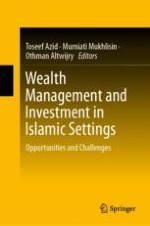
2022 | OriginalPaper | Chapter
1. Wealth Management and Investment: An Islamic Epistemology
Authors : Nasim Shirazi, Othman Altwijry, Toseef Azid, Muhammad Omer Chaudhry
Published in: Wealth Management and Investment in Islamic Settings
Publisher: Springer Nature Singapore
Activate our intelligent search to find suitable subject content or patents.
Select sections of text to find matching patents with Artificial Intelligence. powered by
Select sections of text to find additional relevant content using AI-assisted search. powered by